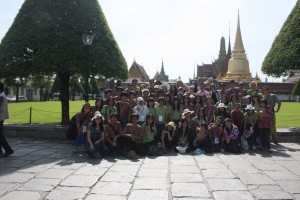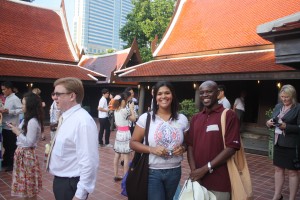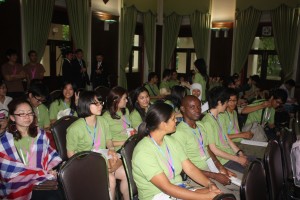Recently Andreas Keller attended the AC21 Student World Forum in Thailand. Here is his experience.
Preparation – Getting There
Two days to go before departure to the Land of Smiles – Amazing Thailand. The excitement is palpable, having been there before some 5 years ago, I have an inkling of what to expect: warm and friendly people, mouthwatering street cuisine, beautiful temple architecture, giant golden Buddhas, exotic fruits – in shapes, sizes and flavours unknown to the South African palate.

I’m excited to participate in the AC21 Student World Forum at Chulalongkorn University. Yesterday the organizers opened a Facebook group for the event, so that we could start interacting prior to the commencement of the forum. I was thrilled to see the diversity of participants – students coming from the global North as well as Moldova, Laos and Guyana!
My preparation has luckily gone pretty smoothly. As a South African, I don’t need to get a visa prior to arrival. I phoned the Thai Embassy in Pretoria and confirmed this with them. I will receive a 30-day tourist visa upon arrival at the airport – essentially a stamp into the passport.
Thailand has got malarial areas – so it is advisable to take some prophylaxis. I’ve decided to use Homeopathic Malaria tablets, primarily because they don’t present any side effects and because they have always been effective when I’ve traveled in malarial areas in the past. On the subject of medication, I have gone to my doctor to get a letter for the prescribed medication that I take. Thailand takes a very strong line against drug offenders, and I don’t want to run the risk of having the tablets I have on me, being suspected of being illegal substances.
I’ve been checking the weather out online for the past few days and it appears as though the weather is hot and humid at this time of year, at ±35C maximum during the days with 75% humidity. It’s not unusual for there to be rain showers – so I will take a raincoat along. This will double as a jersey in order to save space. The only risk of getting cold, from past experience is traveling in an air-conditioned ferry or bus. If you have just been rained wet – this can easily be the cause of illness.
Money matters: The Thai Baht is currently sitting at around 4.5 Baht to the Rand. I’ve decided to take a Cash Passport with – a Visa debit card issued by ABSA (and many other travel agencies and banks). It’s useful in that it can be swiped at the point of sale at no cost and cash withdrawals cost only $2 a time. Money is loaded onto the card in either Euro or US Dollar.
I couldn’t find any direct flights from SA to Bangkok, so I’ve booked with Emirates from Cape Town with a 3 hour stop over in Dubai. I’ve decided to purchase the flight ticket with my credit card, since this automatically gives me travel insurance from ABSA. This is however not sufficient, so I’ve opted to top this up at a cost of R589 (for up to 90 days travel) which will more than sufficiently cover me in medical emergencies.
Preparations done – I look forward to the conference and visiting Thailand again!
Experiences – Being there
We arrived in Bangkok just after lunchtime and were greeted by a group of volunteers of Chulalongkorn University – our hosts. They instructed us to take the Skytrain into town – at 45 Baht (±ZAR 10) to Phaya Thai station (close to the center of town) this is faster and cheaper than taking a taxi for 400 Baht (±ZAR 90).
We were accommodated in Wittayanives residence on the Chulalongkorn campus and within close proximity to amenities and transportation links. The single rooms were air-conditioned with en-suite bathrooms – a welcomed relief after a 20-hour journey.
The AC21 Student World Forum commenced the following day, on Sunday, with a cocktail function, where we had the opportunity to meet our fellow participants as well as the AC21 steering committee and its delegates. Students came from all corners of the globe, from the US, Europe, Australia, Africa and many Asian countries. We were treated to a traditional Thai dancing performance as well as some regional cuisine.

On Monday, after registration, the opening ceremony took place. Introductions, speeches and photographs having been completed, the student participants boarded two busses and headed on a 3 hour journey out of the capital to the coastal area of Borfai. Here we were accommodated in a military airport resort that again was comfortable and located in close proximity to the Huay Sai Royal Development Study Center, which was to be the academic focus of the forum.
After visiting the area approximately 30 years ago, the Thai monarch King Bhumibol Adulyadej observed that the region was close to being turned into a desert after extensive monocultural agriculture. The soil quality was depleted resulting in hard compacted material unable to sustain any biological and botanical life. He devised a technique using Vetiver Grass species to oxygenate, hydrate and nourish the soil – a tool that enabled other plants and organisms to recolonise the soil. This was done in conjunction with a vast irrigation scheme involving reservoirs, canals and checkdams, essential to providing the necessary moisture. Using solar energy, water was pumped into dams on surrounding hills. Through an extensive network of gravity-fed sprinklers, the required humidity was given to newly planted trees, providing the necessary conditions for the forest to rehabilitate itself. Today, the area is lush and green once again.
We were also introduced to the sufficiency economy, a further initiative of the King. This concept speaks towards an optimal land use allocation of individual farmers that would enable them to attain sustainable lifestyles, economic independence and prosperity. Our group visited two farmers in the area that were living examples of the success of this initiative.
Returning to Bangkok on Thursday, groups had time to prepare presentations on various aspects that were covered during the week. The topics included, soil amendment, reforestation, water and quality of life. On Friday, we had a keynote presentation by the Office of the Royal Development Project Board which outlined the development work of the King. Following this, we gave our presentations and received feedback from the academic staff. A closing ceremony involved a review of the activities and experiences of the week as well as the encouragement to maintain and nurture the newly established friendships and networks that arose from the intense week together.
The culmination of the forum was an evening dinner cruise on the majestic Chao Phraya river as well as a tour of the royal palace the following day. It was sad to bid farewell to all the friendly faces, but a forum Facebook page, which had been established prior to the event, will ensure that contacts and dialogue will be sustained.
Reflections – Looking Back
The AC21 Student World Forum was an intense and challenging week and I learnt as much
outside of the realms of the forum as I did from the academic content. Here are a few general and practical reflections:

Academic Content
It is a widely known fact that a major contributor towards the sustainability polycrisis is the global loss of topsoils – something that will undoubtedly contribute towards rising food costs and shortages in the near future. The soil amendment technique we learnt are simple in technological requirement, cheap and easily understood and are thus appropriate for the developing country context. This, coupled with correct water management and efficient reforestation methods can go a long way to rehabilitating and preserving the natural environment.
Furthermore, the economic resilience at the household level, which can be enabled through the adoption of the sufficiency economy, is something that can be introduced to the millions of small-scale rural farmers around the world. The implications that it has for stemming the rate of urbanization, and insulating poorer families of food price hikes, are only two of the benefits of this economic ideology.
Culture and Leadership Styles
The forum was organized and run by 24 student volunteers from Chulalongkorn University. Initially, I thought that this would be counterproductive, that a smaller number of helpers would be more efficient. But I soon observed that this was not the case, that in fact, the Thai students had a flat or horizontal leadership structure. It appeared to me that decisions were reached by consensus, through frequent and quick deliberations, and then communicated to us participants by two of the volunteers who were especially proficient in English. This I found very interesting to observe. The accompanying Professor from the Faculty of Engineering kept a low profile and was only occasionally consulted.
I was also impressed by the willingness to help, the openness to making our stay as comfortable and pleasant as possible. The Thai volunteers were incredibly friendly and went out of their way to accommodate everyone’s needs and wishes. For example, each forum participant was individually accompanied to the airport for their return flight.
Food
The Thai’s eat meat at every meal and oftentimes enjoy eating savory meals such as a shrimp soup or minced pork and rice for breakfast. Whilst being delicious, I found this a little heavy as the first meal of the day. I would recommend travelers make use of the ubiquitous 7Eleven stores where they can find cereals, yoghurt and fruit juices. Many streets have fruit sellers on them, where peeled and ready cut fresh fruits are available.
Getting Around
Bangkok offers numerous modes of transport, including the Skytrain, a subway (metro), buses, canal boats, taxis and tuk-tuks. For quick transportation anywhere in the city, I preferred taxis since they were often equal in price or cheaper than tuk-tuks and being airconditioned, one does not have to endure the polluted air. In order to pay a reasonable fare, I would advise to check with the taxi driver whether he is prepared to use the meter for your journey, and if not, flag down another taxi that will.
It’s good to be back home, but I’m looking forward to my next Thailand visit already. With many of the friendships made, I have a feeling I will receive some Thai visitors here soon!
